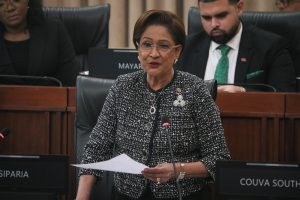By Sue-Ann Wayow
MEMBER of Parliament for Chaguanas West Dinesh Rambally is attempting to undermine the independence, confidence and public trust of the Judiciary of Trinidad and Tobago.
The Judiciary in a media release on Sunday stated that Rambally’s statements made on Saturday, sought to bring the Judiciary into disrepute.
The Judiciary listed out several statements labelled “facts” in its attempts to debunk Rambally’s statements.
In a lengthy press release, Rambally referred to a newspaper report that published a proposal by the Criminal Bar Association to release 60 prisoners as Trinidad and Tobago celebrates 60 years of independence.
He listed out 11 questions pertaining to the Advisory Committee on the Power of Pardon (commonly called the Mercy Committee) and quoted from Section 89 of the Constitution.
Rambally said that based on information from his sources, certain instructions were given to the Judiciary through which some of its staff members were mandated to assist with an ongoing “Mercy Committee” project during the second week in August and that approximately 13 Judicial Research Counsels (JRCs) in conjunction with the Registrar’s Office have been allegedly sifting through court files with a view to compiling a list of eligible persons to be recommended for pardon.
The Judiciary stated that it does in fact constitutionally play a role in the Mercy process.
It also quoted Section 89 of the Constitution: “Where an offender has been sentenced to death by any Court for an offence against the law of Trinidad and Tobago, the Minister shall cause a written report of the case from the trial Judge, together with such other information derived from the record of the case or elsewhere as the Minister may require, to be taken into consideration at a meeting of the Advisory Committee.”
The Judiciary stated that the Mercy Committee through the acting Permanent Secretary in the Ministry of National Security wrote to the Judiciary asking for copies of records of the cases in relation to certain persons who have been sentenced to death by the Court and are seeking an early release via Presidential Pardon in accordance with provisions of the Constitution.
“The Judiciary did not compile a list of eligible persons to be recommended for pardon,” the release stated.
Many of matters listed were very old matters and the Judiciary staff were required to locate files in diverse archival spaces and bring them to one place. The Registrar as Keeper of the Record in conjunction with the Court Administration Unit acted to fulfil the request. Bearing in mind the timeframe required to provide the information, a team including Registrars, Judicial Research Counsel and the Courts Records Unit were assigned to review the files and secure the necessary documentation to be sent to the Mercy Committee.
The release stated that additionally, many of the matters were voluminous and old, it would have been impossible to obtain a report from the trial Judge, many of whom are either retired or deceased. The Judiciary pulled together a team of legally trained staff to prepare a factual precis of the proceedings from the records.
Copies of the documents requested and the precis for each were forwarded to the Acting Permanent Secretary. Acting Chief Justice Allan Mendonça, the Court Executive Administrator and the Registrar maintained oversight of the exercise from its inception to completion.
The Judiciary also commended its staff members for undertaking the task and working through the Covid-19 pandemic facilitating the hearings most of which took on a virtual format.
The Judiciary stated, “As with all scuttlebutt, the facts tend to be abandoned for a more disruptive narrative. The Judiciary notes with increasing concern the carelessness, which persons who have an audience, approach matters that involve perceived threats to the independence of the Judiciary.”
It continued, “It is highly irresponsible and dangerous to our democracy and to peace, order and good governance for anyone especially anyone in a position of responsibility, who has the ear of the public, to publish erroneous information. It is especially irresponsible to do so in a way as to alarm the public into believing that the Judiciary is not independent and is involved in some nefarious collusion.”
![]()













